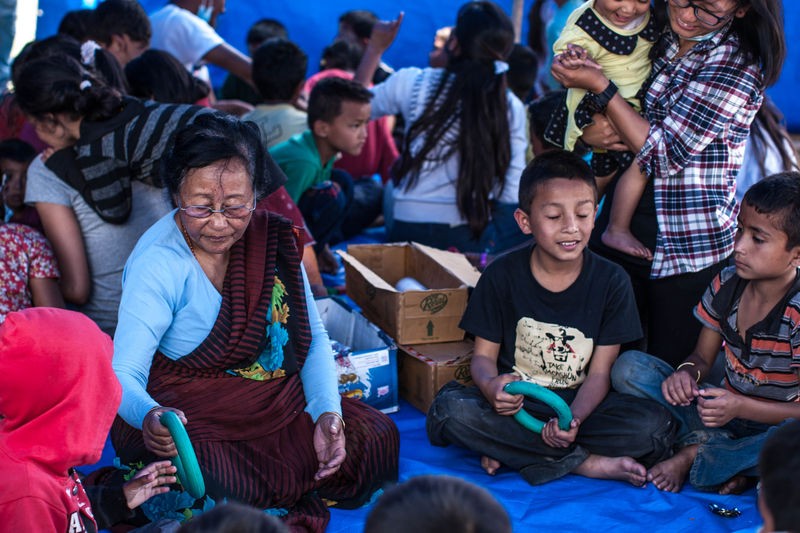
At a school inside Ratnapark camp, the main refugee camp in Kathmandu, children play, laugh and forget the disaster that hit Nepal. Image by Julien Brebion, Copyright Demotix (1/5/2015)
I still can’t imagine it was an earthquake. The futsal match between Practical Action and Handicap International was running at full throttle and 1-1 was the result. My three-and-a-half-year-old daughter was cheering for Practical Action, the charity I work for, together with the daughter of my colleague Sachin. Suddenly, people started running away from the futsal ground. I thought a fight had broken out. Then I heard sound of something collapsing. There was a huge roar. The spectators were running for safety. It was an earthquake. And it was big. Very big!
In spite of the hullabaloo, my main concern was the two little girls I had to take care of, who had no idea what was happening. I took hold of both and we ducked for cover. Both of them were terrified to the bones by the stampede. Sachin ran to us frantically from the futsal ground and helped me take the girls to a safe place.
All assembled were in a panic, trying to call their close relatives to no avail. During the stampede some of the spectators had suffered injuries. A wall next to the ground fell down and crushed my friend’s motorbike. As everybody was getting a handle on the situation, a frightening aftershock rocked the place. It was strong enough to send chills down everybody’s spines.
This is where we were when #NepalQuake started @PracticalAction #3rdAINFutsalTournament #postquakepic pic.twitter.com/FyrUpQlopU
— Iron Lion Zion (@prabingurung) April 27, 2015
There was nothing we could do. No calls were going through, but 3G service was still working in some mobile phones. Thanks to social media, the updates from around Kathmandu started pouring in. The first shock was the collapse of Dharahara, the famous minaret in the heart of Kathmandu. The pictures of destruction continued: Durbar High School, one of the first schools in Nepal, Kathmandu Durbar Square, apartments and houses. The list went on.
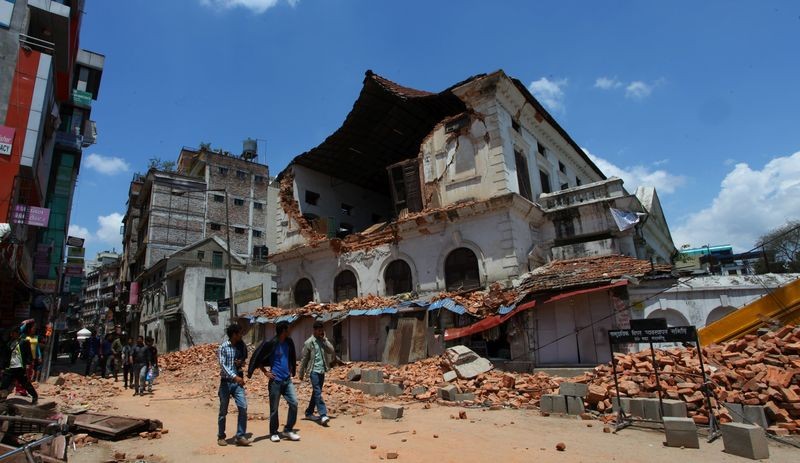
Durbar High School, the first high school of Nepal, was one of the important buildings damaged in the earthquake. Image by Sunil Sharma. Copyright Demotix (27/4/2015)
Annie Gowen, India correspondent for the Washington Post, tweeted:
The picturesque village of Barpak was at the epicenter of Nepal's earthquake. Now it's flattened. http://t.co/gcsDRyFaSj by @anupkaphle
— Annie Gowen (@anniegowen) April 27, 2015
The kids who had accompanied their parents to the match were inconsolable. They wanted to get back to their homes. But the continuous aftershocks and a rumour that even stronger quake was to happen prevented us from leaving the place.
Pillion-riding back to my place, I could see the devastation, though in bits and pieces. The traumatised Kathmanduites were out on the streets. Many walls had collapsed, and many houses had visible cracks. My little daughter pointed out instances of devastation, saying it was due to the earthquake.
The following days were horrific—living in tents throughout the day and night with rumours floating around of a bigger earthquake to hit the city, causing more fear and panic. We took refuge in a school compound nearby. I was disconnected from the world, as there was no electricity and no internet for two days, let alone a supply of water. The whole neighnourhood was crammed into the school compound. For the next few days we had no proper meals, just instant noodles, puffed rice, biscuits and random tidbits.
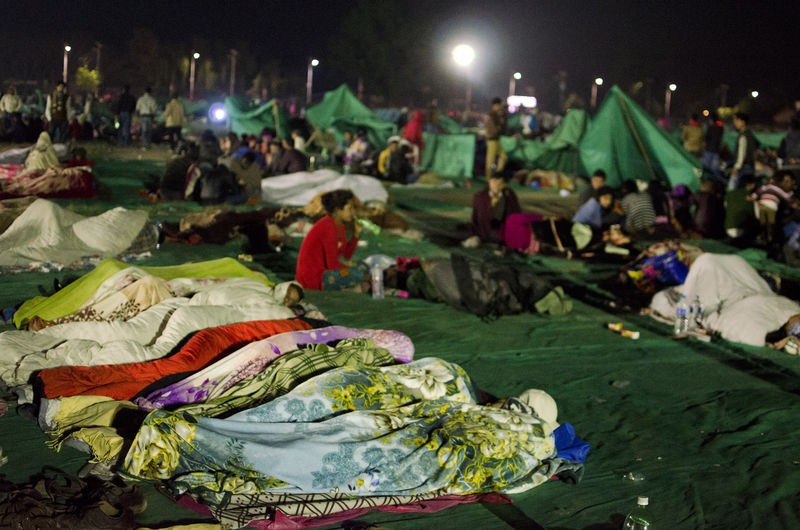
Tundikhel became a makeshift open camping space for public who feared returning their homes due to frequent aftershocks after a 7.8-magnitude quake hit Nepal on Saturday. Image by Sumit Shrestha. Copyright Demotix (25/4/2015)
The good thing about living in tents and together with the surrounding community was that we were able to bond. I had never spoken to my next-door neigbours, but after spending days and nights together I became good friends with many of them. The whole neighbourhood was suddenly talking to each other!
After putting up with hundreds of aftershocks and sleepless nights, I finally returned to my office on 28 April. However, I had not recovered sufficiently to resume my daily routine. I would once in a while get call from my wife and daughter asking me to get home early.
On my second day at work, I decided to visit the damaged sites. As I entered the New Road Gate, the once vibrant street, normally bustling with crowds, seemed more like a street in an abandoned city. The few people passing through the area did so in a hurry, in order to avoid the possibility of being struck by falling debris from the ruined buildings.
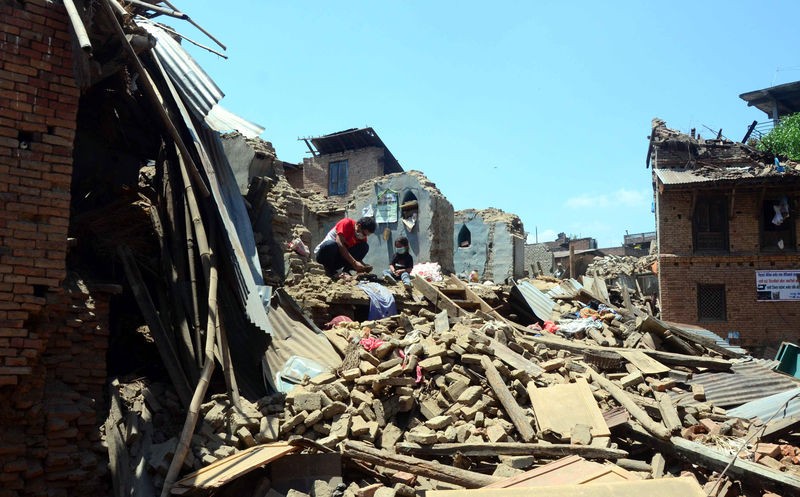
A man and his daughter searche for their belongings among the debris of a collapsed house at Sankhu village in Nepal. Image by Ritesh Shukla. Copyright Demotix (2/5/2015)
Even I hurried as I passed through the usually crowded street, now a lifeless thoroughfare. The buildings seemed like tall demons ready to devour me. Arriving at the Joshi Complex, my usual after-work hangout with friends for stress-buster chats over cups of tea, I was dumbfounded by the silence of the place. Even four days after the horrific tremor, none of the shops were open.
Arriving at Basantapur, I found a barricade with a “No Entry” sign. So I took a detour via Jhochhen, or Freak Street. As I reached the Basantapur Dabali, site of my weekend jaunts, I could barely contain myself. There was a lump in my throat and I tried hard to stop the tears trickling down. The nine-storey palace was nowhere to be seen. Sitting in front on the Dabali, I would often gaze at the beauty and grandeur of the place. It had all gone within a matter of minutes.
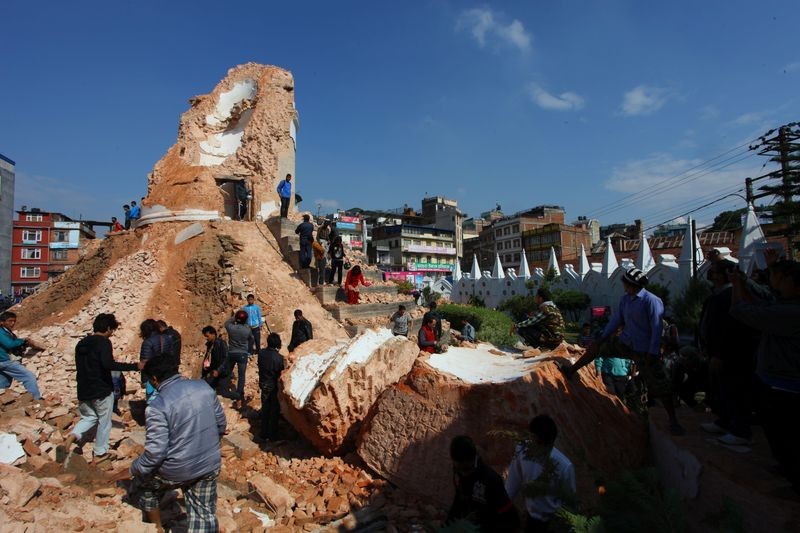
The nine-storey Dharahara, also known as Bhimsen Tower, lies in ruins. Image by Sunil Sharma. Copyright Demotix (27/4/2015)
Returning via Dharahara, the pride of Kathmandu rebuilt by Nepal’s first Prime Minister Bhimsen Thapa after it was devastated in 1934 AD earthquake, I saw a short stump instead of the familiar nine-storey, 61.88-metre-tall (203 ft) tower. Along with durbar squares in Kathmandu, Patan and Bhaktapur—all World Heritage Sites—Dharhara, Kal Mochan and many significant monuments were reduced to mounds of earth.
According to the Ministry of Home Affairs, the 7.8 Richter scale earthquake that shook not only the country but also the confidence of Nepalis, has claimed lives of 6,250 and injured 14,357 as of May 1. Around eight million people have been affected, with 143,673 houses damaged and another 160,786 destroyed. The Gorkha, Sindhupalchok, Nuwakot, Rasuwa, Dhading, Kathmandu, Bhaktapur, Lalitpur, Kavrepalanchok, Dolakha, Ramechhap, and Sindhuli districts were been badly hit by the earthquake.
Can an earthquake be so ruthless? I still can’t imagine it was an earthquake: it was an Armageddon. But our never dying spirit hasn’t subsided. We will soon bounce back.
Journalist Ujjwal Acharya tweeted:
So many people tirelessly & voluntarily providing time & resources to help others after #NepalQuake. Humanism is alive! Salute to them all!
— Ujjwal Acharya (@UjjwalAcharya) April 30, 2015
For the relief work, the government has identified shelter, WASH (water, sanitation and hygiene), health and food as the major priorities. Practical Action has rushed to its work areas in Gorkha and Dhading, two of the most affected districts.
Practical Action South Asia Regional Director Achyut Luitel tweeted:
@PracticalAction mobilising teams for Gorkha & Dhading for WASH & temp shelters. Starting in 2 villages each. #NepalEarthquake #PrayforNepal
— Achyut Luitel (@achyutluitel) April 29, 2015
A version of this article appeared on Practical Action’s blog.







